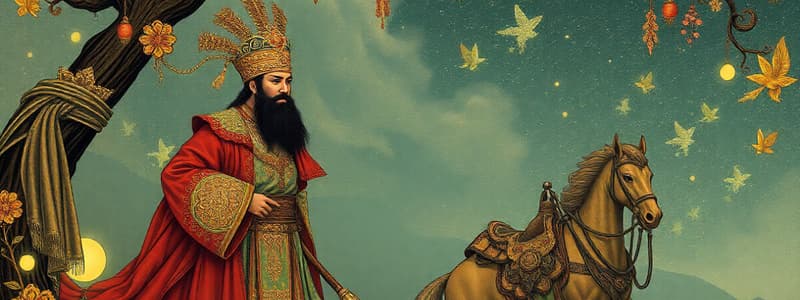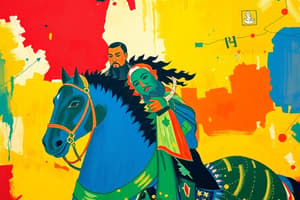Podcast
Questions and Answers
What was one of the main reasons Genghis Khan aimed to unify the Mongol clans?
What was one of the main reasons Genghis Khan aimed to unify the Mongol clans?
- To unite for better trade rights
- To spread their culture to other nations
- To create a new law code (correct)
- To establish a formal government structure
Which Khanate was controlled by Kublai Khan after the death of Genghis Khan?
Which Khanate was controlled by Kublai Khan after the death of Genghis Khan?
- The Southern Khanate
- The East Khanate (correct)
- The Western Khanate
- The Central Khanate
What characterized the societal interaction between the Mongols and the Chinese during the Yuan Dynasty?
What characterized the societal interaction between the Mongols and the Chinese during the Yuan Dynasty?
- Mongols and Chinese exchanged governance roles
- Mongols forced integration with Chinese culture
- Mongols lived apart and did not interact with the Chinese (correct)
- Mongols adopted Chinese customs and laws
Which practice was not utilized during the Yuan Dynasty's governance?
Which practice was not utilized during the Yuan Dynasty's governance?
What significant achievement did China reach under Mongol rule?
What significant achievement did China reach under Mongol rule?
How did the Mongols influence trade during their conquest?
How did the Mongols influence trade during their conquest?
Which of the following best describes the Mongol's approach to cultural beliefs?
Which of the following best describes the Mongol's approach to cultural beliefs?
What role did Marco Polo play during Kublai Khan's rule?
What role did Marco Polo play during Kublai Khan's rule?
Flashcards
Mongol Expansion
Mongol Expansion
A period in history where the Mongol Empire expanded, conquering vast territories and leaving a lasting impact on the world.
Mongol Clans
Mongol Clans
The group of Mongol tribes that Genghis Khan united under his leadership, forming the foundation of the Mongol Empire.
Yuan Dynasty
Yuan Dynasty
Kublai Khan's establishment of a new dynasty in China after conquering the Southern Song, replacing the previous dynasty.
Distinct Mongol Culture
Distinct Mongol Culture
Signup and view all the flashcards
Khanbaliq
Khanbaliq
Signup and view all the flashcards
Quanzhou
Quanzhou
Signup and view all the flashcards
Marco Polo's Travels
Marco Polo's Travels
Signup and view all the flashcards
Mongols and Gunpowder
Mongols and Gunpowder
Signup and view all the flashcards
Study Notes
Mongol Expansion
- The Mongols developed skills crucial for nomadic life, including horsemanship and combat.
- Genghis Khan unified Mongol clans, establishing a new legal code.
- His conquests extended to various civilizations beyond the steppes.
- After Genghis Khan, the empire was divided into khanates, with Kublai Khan controlling the eastern part focused on controlling China.
- The Mongols' conquests significantly impacted the lands they conquered.
- They fostered trade and cultural exchanges between Asia and Europe, introducing gunpowder technology from China.
- Mongols generally tolerated different cultures and religions, even adopting some aspects of conquered societies.
Mongol Conquest of China
- Kublai Khan established his capital in Khanbaliq (present-day Beijing).
- Kublai Khan ended the Song Dynasty, establishing the Yuan Dynasty in China.
- The Mongols governed with their unique laws and customs, often separating themselves from the Chinese populace.
- The Yuan Dynasty did not rely on the traditional Chinese civil service examinations for government positions.
- China experienced a period of wealth and power under the Mongol rule (Yuan Dynasty).
- Marco Polo, a Venetian traveller, spent time in Khanbaliq during Kublai Khan's rule, witnessing and recording the empire's grandeur and trade.
- The Yuan Dynasty promoted maritime trade, leading to increased interactions and knowledge exchanges.
- The Mongol empire facilitated interaction with other cultures and civilizations, including the introduction of European, Middle Eastern, and South Asian merchants to China and China's innovation and technology throughout Eurasia.
- The Mongols employed Koreans to build naval vessels.
- Quanzhou was a significant port city in that era, supported by previous Chinese dynasties, and it continued to thrive under the Yuan
Studying That Suits You
Use AI to generate personalized quizzes and flashcards to suit your learning preferences.




